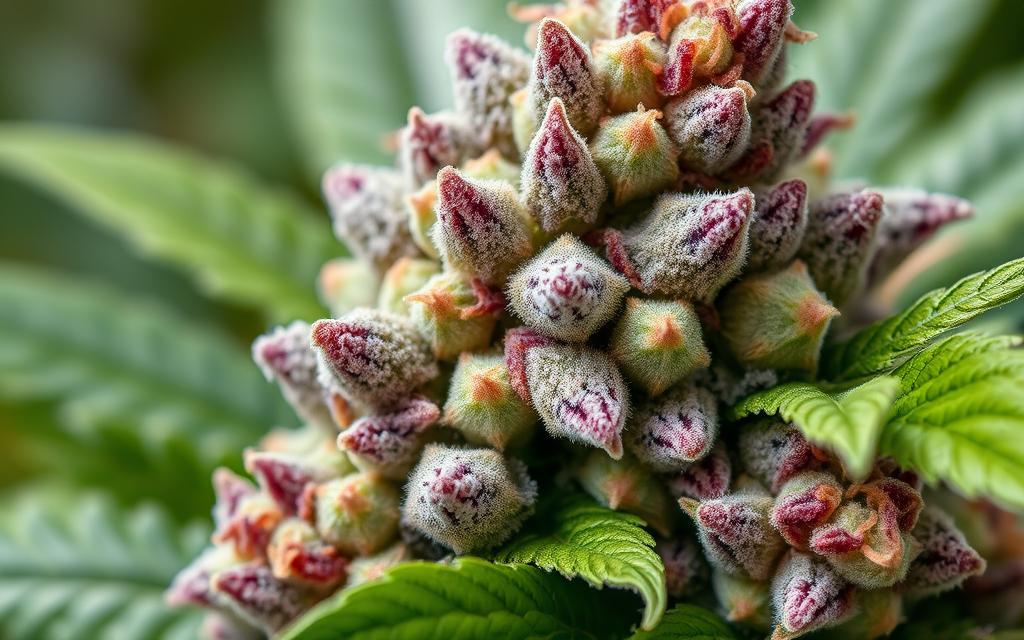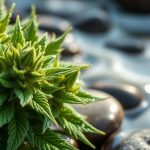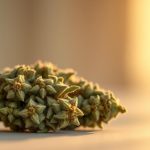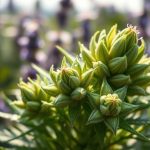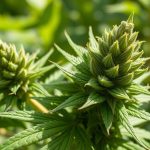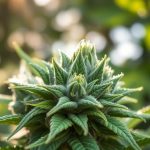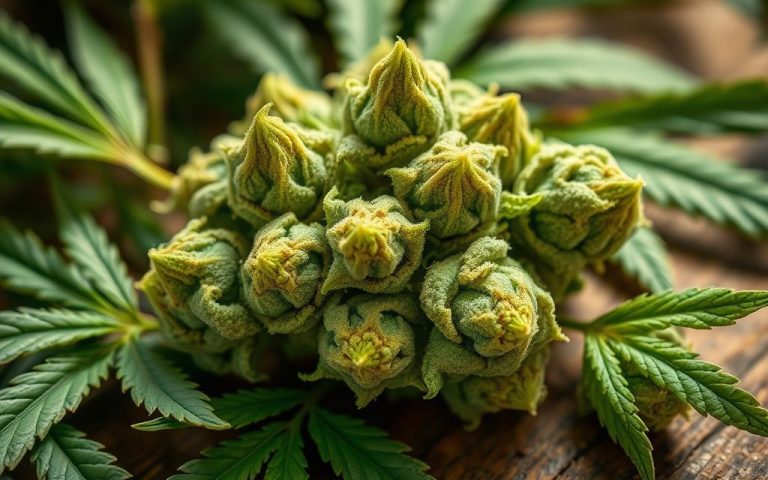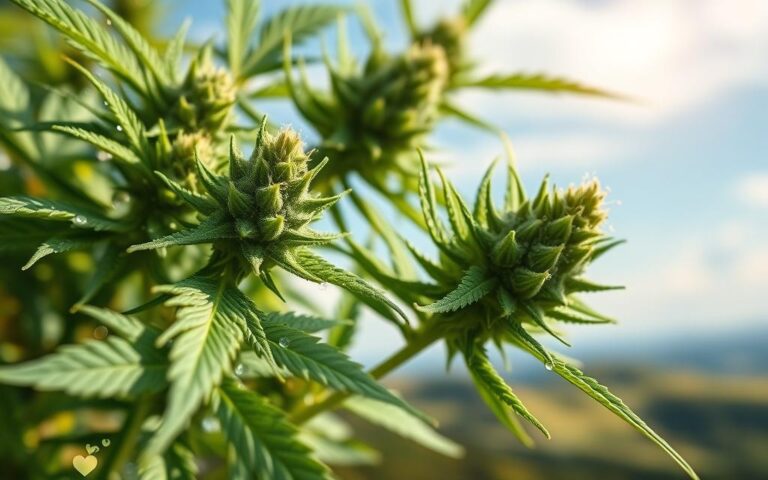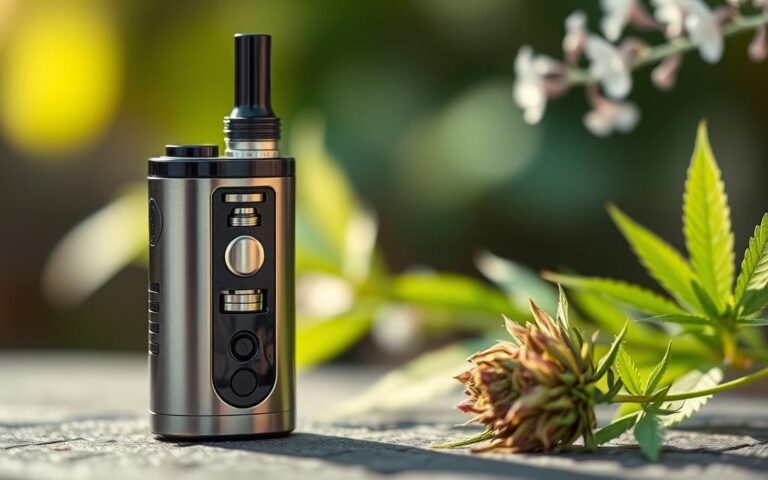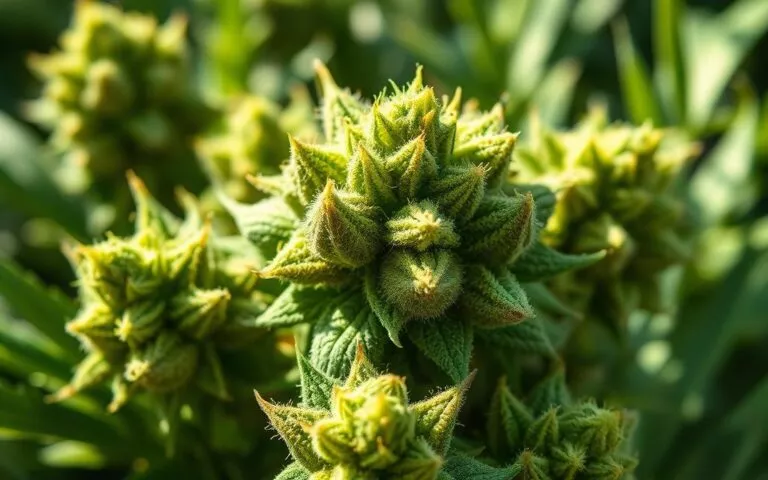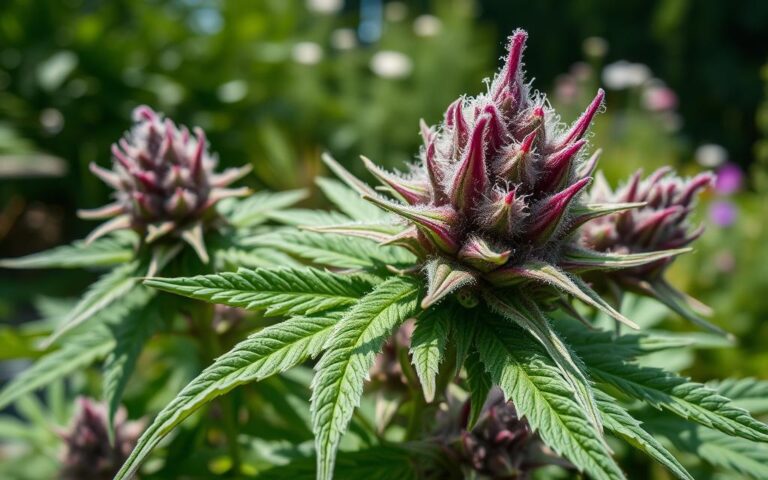Understanding CBD THCA Flower
In today’s world, cannabinoids like CBD and THCA are getting a lot of focus. CBD THCA flower is a mix of two important cannabinoids, showing unique traits and benefits. It’s vital for both cannabis fans and researchers looking into their health uses.
The difference between THCA and CBD is crucial. It helps us understand their roles in health and wellness. This knowledge allows us to see the value of CBD THCA flower in complete health care.
Introduction to Cannabinoids
Cannabinoids are key in cannabis research and its promising uses. These compounds are found in the cannabis plant. They work with the body’s endocannabinoid system, producing various effects that help health and well-being.
What Are Cannabinoids?
Over 100 cannabinoids have been found by researchers, including well-known compounds CBD and THC. The way these cannabinoids interact with the body’s receptors affects their strength and healing potential. Whereas CBD is safe and not addictive, THC can cause minor side effects like dry mouth and red eyes.
Importance of Research in Cannabis
Continued research into cannabis is key for discovering the benefits of cannabinoids. Changes in laws have allowed for more study into its medical uses. Since cannabis strength has increased over the years, understanding these compounds is crucial.
The 2018 Farm Bill defines hemp as having under 0.3% THC. This move directs research toward safer therapeutic options.
Research is delving into cannabinoids like THCA for its potential anti-inflammatory and brain-protecting benefits. As medical cannabis becomes more accepted, thorough research is needed. It will help to show its usefulness and safety, guiding consumers and medical advice.
| Aspect | THC | CBD |
|---|---|---|
| Psychoactive | Yes | No |
| Common Effects | Euphoria, dry mouth | Relaxation, anti-anxiety |
| Legal Status | Varies by state | Generally legal under 0.3% THC |
| Health Benefits | Potential for pain relief | Widely recognised for safety and anti-inflammatory |
What is CBD?
Cannabidiol, also known as CBD, comes from hemp and marijuana plants. It’s known for its health benefits without making people feel “high.” Many health and wellness products include CBD. This shows its importance and potential for health care.
Definition and Properties
The chemical makeup of CBD is C21H30O2. It has 21 carbon atoms, 30 hydrogen atoms, and 2 oxygen atoms. Unlike THC, CBD won’t get you high. This is why people prefer it for getting cannabis benefits without the psychoactive effects.
How CBD Interacts with the Body
CBD works by interacting with the body’s endocannabinoid system. This system helps regulate moods, pain, and how our body’s defense system works. By affecting this system, CBD can help improve health.
Potential Health Benefits of CBD
Studies show CBD could be good for health in many ways. It might help with:
- Reducing anxiety and depression
- Easing inflammation and pain
- Better sleep quality
- Helping those with epilepsy
Research is ongoing about CBD’s uses in pain and muscle care. With laws changing, more people are learning about CBD’s benefits. This is making CBD more popular and accepted for health use.
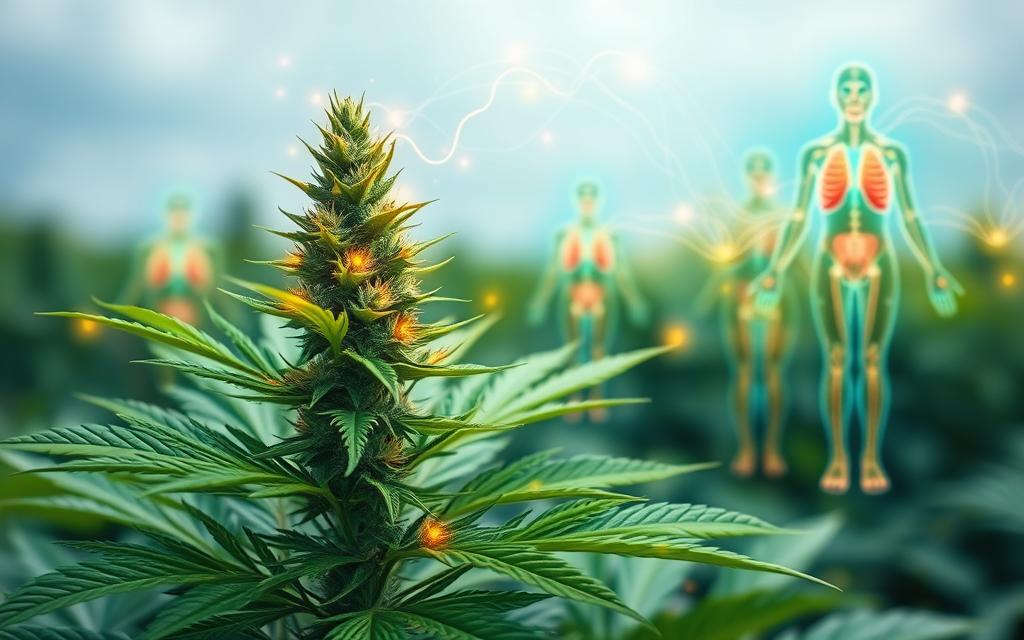
| Health Benefit | Research Findings |
|---|---|
| Anxiety Relief | Studies suggest CBD may reduce anxiety levels significantly. |
| Anti-inflammatory | Cannabidiol has shown promise in reducing inflammation. |
| Pain Management | Evidence indicates effectiveness in chronic pain treatment. |
| Epilepsy Treatment | CBD is approved for certain types of epilepsy (e.g., Epidiolex). |
What is THCA?
Tetrahydrocannabinolic acid, or THCA, is a natural part of cannabis plants. It’s mostly in the raw, fresh buds. Unlike other compounds, it doesn’t make you feel high when eaten raw. Knowing about THCA is important for those diving into the health benefits of cannabis.
Definition and Characteristics
THCA is plentiful in fresh cannabis. People looking at the plant’s health side focus on it a lot. It is known for reducing inflammation and protecting neurons. It can also combat nausea and act as an antioxidant.
Research is exploring its uses, like fighting neurodegenerative diseases. Dementia, a big cause of death among elders, might be managed with it. THCA helping against nausea and vomiting is also promising, especially for patients in certain treatments.
How THCA Converts to THC
Heating THCA through smoking, vaping, or cooking changes it into THC. This change causes the high that cannabis is known for. It’s key to know that THCA’s benefits don’t make you high, yet reactions to it can vary.
Starting with small amounts can help find out what works for you. Being careful and responsible, especially with health issues, is important. For more on how THCA differs from other cannabinoids, check here: understand more here.
Understanding CBD THCA Flower
THCA flower is raw cannabis buds full of tetrahydrocannabinolic acid. This form of cannabis is gaining attention for its medical potential. Many are exploring the uses of THCA for its health benefits. It’s important to understand its traits and how to use it.
What is THCA Flower?
Unlike usual cannabis, THCA flower has lots of tetrahydrocannabinolic acid but doesn’t get you high until it’s heated. It mostly comes from hemp, keeping under 0.3% THC, which fits the 2018 Farm Bill rules. Labs check its cannabinoid levels, showing it could help protect nerves and reduce swelling.
Uses and Forms of THCA Flower
You can use THCA flower in different ways, like:
- Eating it raw to keep its non-psychoactive effects.
- Heating it to change THCA into THC for a high.
- Adding it to food for a flexible way to take it.
There are many THCA flower products available. For example, the Jealousy CBD THCA Flower is £49.99, with a THCA content of over 27.20%. The Doc OG CBD THCA Flower also costs the same but has more than 29.11% THCA. Remember, the rise of non-psychoactive cannabis doesn’t change the importance of knowing your local THCA laws.
THCA flower links non-psychoactive and psychoactive cannabis uses. It offers therapeutic benefits and many ways to use it, according to what you like. With ongoing cannabis studies, we may find out more about how THCA flowers can help us.
Differences Between THCA and CBD
THCA and CBD are quite different in their structures, benefits, and effects on the mind. It’s vital for users to know these differences to get the most out of each cannabinoid.
Molecular Structure and Interactions
Though THCA and CBD share similar molecular formulas, their structures differ a lot. THCA’s extra carboxylic acid group stops it from attaching to brain receptors. This means it’s not psychoactive until heat changes it into THC, which is psychoactive. CBD, on the other hand, affects the endocannabinoid system in a unique way. It offers relief without the “high” THC brings.
Health Benefits Comparison
Both THCA and CBD bring promising health benefits to the table. CBD is known for easing anxiety, reducing inflammation, and helping with neurological health. It’s being studied for use in treating stress disorders to epilepsy. THCA shows promise in reducing inflammation and nausea. Each of these cannabinoids supports the other, which can be great for overall health.
Psychoactive Properties
The issue of psychoactivity is key in comparing THCA and CBD. THCA does not affect the mind unless it’s heated, which turns it into THC. This is when the psychoactive effects kick in. CBD does not change mental states, making it a preferred choice for those looking therapy without the high. Understanding these cannabinoids is crucial for grasping how cannabis affects health and wellness.
Potential Therapeutic Effects of THCA
THCA has caught the attention of medical researchers because of its possible healing powers. Studies are uncovering its potential to treat various conditions. It could fight inflammation, stop nausea, and protect the brain, making it vital for health.
Medical Research and Findings
Research highlights THCA’s impact on brain disorders. It lessens harmful proteins linked to diseases like Alzheimer’s. Mice studies showed THCA reduced brain cell death from certain treatments, pointing to its brain-protecting benefits.
Therapeutic Applications
THCA’s benefits may go beyond the brain. New studies suggest it might help with epilepsy and memory problems. Knowing how THCA can heal is crucial. More research and support could lead to new, cannabis-based cures, improving lives.
Conclusion
Digging deeper into CBD THCA flower shows us its big role in health and wellness. We learn about THCA and CBD, how they work, and their benefits. While many know about CBD’s health perks, THCA is getting noticed for reducing swelling and protecting nerves.
The future of these cannabinoids depends on more research. After the 2018 Farm Bill, interest in CBD THCA flower is growing. People need to stay updated, talk to doctors, and choose what’s best for their health.
The world of cannabis-based medicine is always changing, bringing new chances for treatment. The focus on THCA flower shows how much there is to learn. By making smart, informed choices, we can use these plants to feel better.
FAQ
What is the difference between THCA and CBD?
THCA and CBD differ in their molecular structures and effects on the mind. THCA can turn into THC, which affects the brain, when heated. CBD doesn’t change in this way and doesn’t make you feel “high”. Both help with pain and reducing swelling, but only THCA has psychoactive potential when heated.
How can I use THCA flower?
You can enjoy THCA flower by smoking, vaping, or using it in edibles. Although THCA is not psychoactive by itself, heating transforms it into THC. This process allows for a mind-altering experience while maintaining its health benefits, like easing pain and fighting inflammation.
What are the potential health benefits of CBD?
CBD could bring several health perks, like lessening worry, cutting down swelling, and pain ease. It works with our body’s own systems, possibly balancing different body processes. CBD has gained fame for its healing promise in health fields.
Is THCA flower legal?
The legality of THCA flower changes from place to place. In the UK, hemp products with a small amount of THC are usually legal. However, cannabis with more THC is controlled. Always check your local laws to stay within the legal bounds regarding cannabis items.
What does research say about THCA’s therapeutic effects?
Initial studies point to THCA having healing effects like reducing swelling, preventing nausea, and protecting nerve cells. Research is ongoing into how it might help with epilepsy and diseases affecting the nerves. More studies will confirm these results and improve how we use it clinically.
Can I experience psychoactive effects from THCA?
No, THCA on its own won’t get you high. But, if you heat THCA, like by smoking or vaping, it turns into THC. THC has psychoactive effects. So, THCA keeps its benefits without the high until you heat it up.
How does cannabis research impact health and wellness?
Research into cannabis is key in understanding how compounds like THCA and CBD can help us. It’s shaping consumer choices and leading to new medical solutions. Studying these compounds shows us their role in promoting health and managing illnesses effectively.
Are there any side effects associated with using CBD?
Mostly, CBD is easy to get along with, but some might feel tired, have diarrhoea, or changes in how hungry they feel. Talking to a medical professional before trying CBD is wise, particularly if you’re already on other treatments or have health issues.

